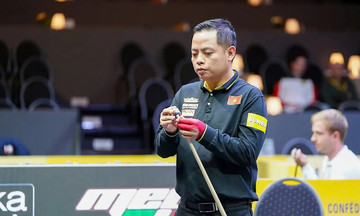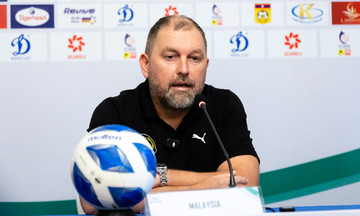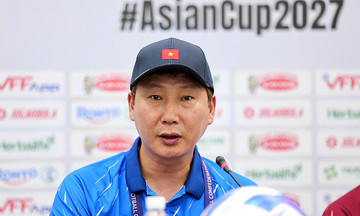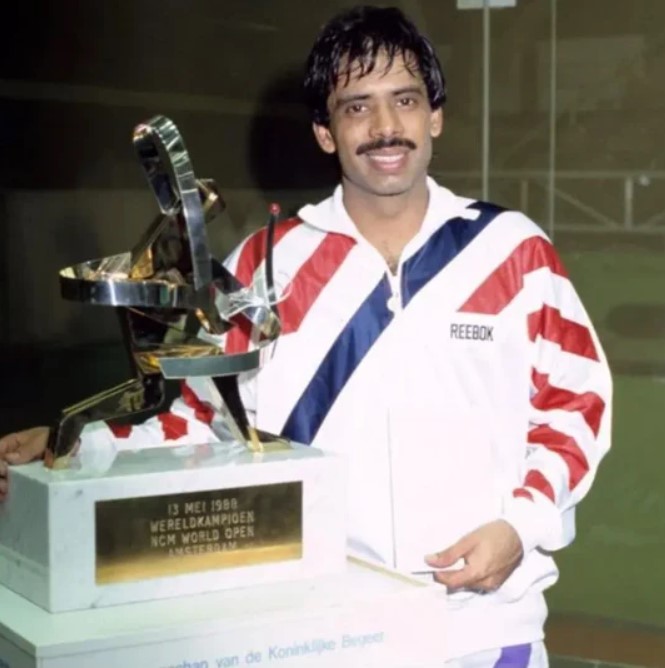 |
Jahangir Khan wins his sixth World Open title in 1988. Photo: Unsquashable |
Jahangir Khan wins his sixth World Open title in 1988. Photo: Unsquashable
The name “Jahangir” means “world conqueror” in Urdu, Pakistan’s official language. Jahangir lived up to this name, dominating squash throughout the 1980s and early 1990s with six World Open titles and 10 consecutive British Open championships.
Squash is a racquet sport played with a rubber ball in an enclosed court with four walls. Two or four players alternate hitting the ball against the walls. The ball must bounce once, or not at all, before the opponent returns it. The ball can reach speeds exceeding 250 km/h. Forbes magazine has called squash one of the most physically demanding sports due to this fast pace, intense exertion, and tactical complexity. It is considered one of the world’s most demanding indoor sports.
Born on 10/12/1963 in Karachi to a family with a rich squash tradition, Jahangir faced early skepticism about his involvement in the sport. Due to a severe hernia, doctors warned his father against letting him pursue such a physically strenuous activity. “He told my father: ‘Under no circumstances should you let this boy play squash, as it will seriously damage his health’”, Jahangir recalled to World Squash.
Despite undergoing two surgeries, Jahangir persevered with his training under the guidance of his father and older brother, Torsam Khan. In 1979, at 15, he surprisingly won the World Amateur Championship, becoming the youngest ever champion.
Tragedy struck when Torsam died suddenly of a heart attack on the court at 27. “It was an incredibly difficult time for my family. I told myself I didn't want to play squash anymore”, Jahangir remembered.
After months away from the game, he returned to honor his late brother. “I was in great pain and often cried alone, but deep down, I knew I had no choice but to persevere, to keep my brother's glory alive”, Jahangir explained.
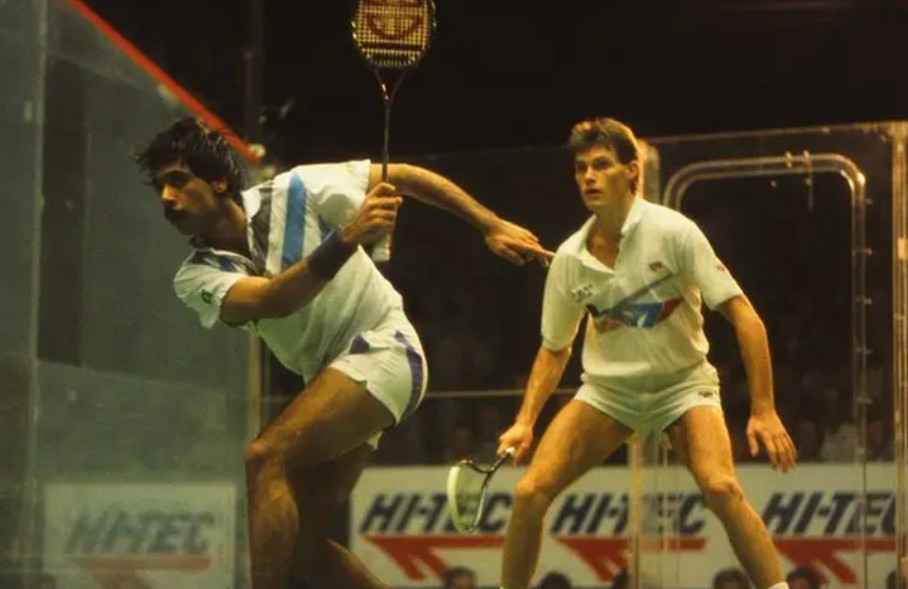 |
Jahangir Khan (left) became the youngest world champion, at 17, in 1981. Photo: Rex |
Jahangir Khan (left) became the youngest world champion, at 17, in 1981. Photo: Rex
Coached by his cousin Rehmat Khan, Jahangir quickly rose to the top. In 1981, at 17, he won the World Open, becoming the youngest champion in history. This victory marked the beginning of his 555-match winning streak, spanning five years and eight months. The Guinness Book of World Records recognizes this feat as the longest unbeaten run in any professional sport. The streak ended at the 1986 World Open final when Jahangir lost to Ross Norman, but this loss did little to diminish the unprecedented record.
During his career, Jahangir won the World Open six times and holds the record for 10 consecutive British Open titles from 1982 to 1991. He held the world number one ranking for 94 months, from 1/1982 to 4/1992, dominating the sport for over a decade. While he trails fellow countryman Jansher Khan (eight-time champion) in World Open titles, his British Open record remains unbroken.
Jahangir's success stemmed not only from his physical prowess but also from his intelligent gameplay. He was known for his court coverage, agility, quick reflexes, and near-perfect shots. Opponents often described playing against him as "running into a wall"—no escape, no openings. His ability to maintain high intensity over multiple games made him a formidable opponent.
Jahangir’s influence extended beyond the court. His success helped elevate squash into a global sport, paving the way for athletes from countries beyond Pakistan and Egypt. International journalists compared him to legends like Michael Jordan in basketball and Pele in soccer—icons who transcended their sports to become cultural figures.
 |
Jahangir Khan is honored with the Outstanding Achievement in Sport Award at the 2018 Asian Awards held in London, England. Photo: Pakistanshining |
Jahangir Khan is honored with the Outstanding Achievement in Sport Award at the 2018 Asian Awards held in London, England. Photo: Pakistanshining
Jahangir retired in 1993 after leading Pakistan to victory in the World Team Championship in his hometown of Karachi. He later held several administrative positions, including President of the World Squash Federation from 2002 to 2008. The Pakistani government honored him as the "Athlete of the Millennium," and the United Nations recognized him as one of the greatest athletes of the past 1,000 years.
While squash may not enjoy worldwide popularity, Jahangir Khan’s name remains a testament to the power of determination. From a boy discouraged from playing by doctors, he became an undisputed legend. Jahangir is not only the greatest squash player in history but also an enduring symbol of the spirit of sport—where willpower can turn the impossible into reality.
Compiled by Hong Duy





